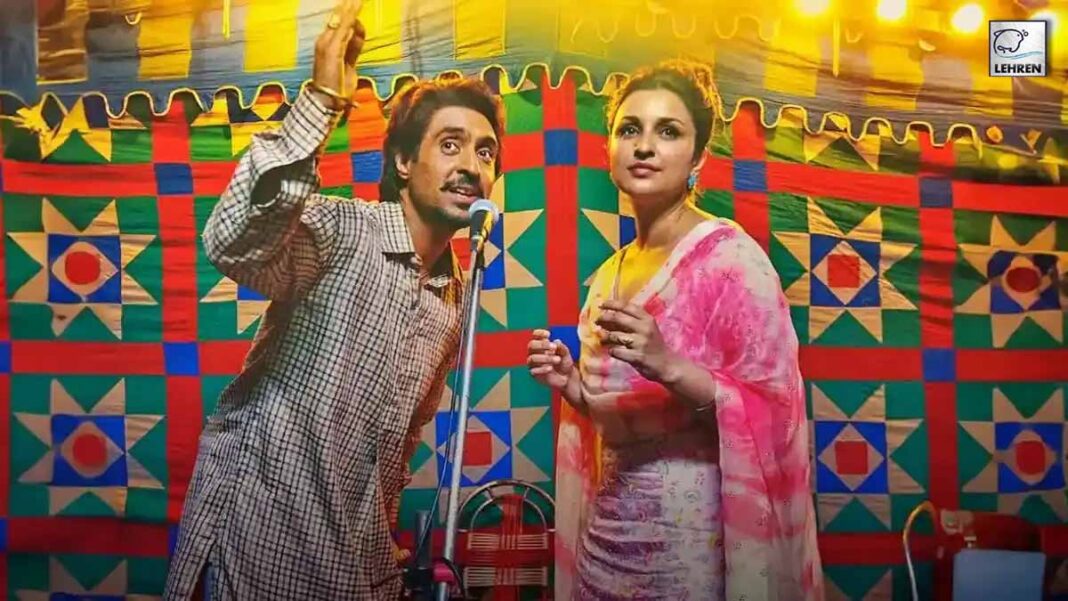Amar Singh Chamkila Star Cast/ Actors: Diljit Dosanjh as Amar Singh Chamkila, Parineeti Chopra as Amarjot Kaur, Apinderdeep Singh as IT Officer Swarn Sivia, Nisha Bano, Rahul Mittra as DSP Bhatti, Vipin Katyal, Anjum Batra as as the drunken friend, Udaybir Sandhu, Anhad Singh, Sahiba Bali
Amar Singh Chamkila Director: Imtiaz Ali
Amar Singh Chamkila Release Date: April 12, 2024
Amar Singh Chamkila Available On: Netflix OTT Platform
Amar Singh Chamkila Released/ Available In Languages: Hindi & Punjabi
Amar Singh Chamkila Run Time: 145 Minutes
Amar Singh Chamkila Critic Review:
Writer-director Imtiaz Ali (who co-writes with Sajid Ali) makes a stark beginning.
1988. Panjab. Families and droves of fans are abuzz with excitement. Amar Singh Chamkila (Diljit Dosanjh), the last word in entertainment, is arriving any moment. The familiar Ambassador is spotted. Chamkila steps out. So does singing partner and wife Amarjot (Parineeti Chopra). An unexpected shot on her forehead. She slumps. A few more shots. Chamkila falls. Both husband and wife have been shot dead.
A friend who’d known him since the days he was a factory worker knitting socks for a meagre living, drunkenly recalls how “I made Chamkila”. Why didn’t you make yourself, jeer those listening to his rants. “Because I was not a scoundrel like him.” The ex-friend’s flashbacks, interjected by a senior police officer and small bits from a tax official who’d grown fond of him, flesh out the fascinating life and death of one of Panjab’s most famous singers.
“But he was vulgar, wrote and sang such lewd songs.”
That was the one line which haunted Amar Singh Chamkila.
The moral police debate will never abate. Chamkila catered to an audience that loved his vulgarity –elderly women, young girls, all included, along with the young and old men who thronged his shows and bought his chartbusting records.
But some in Panjab and some in Canada (where too he was a huge hit, drawing more crowds than his idol Amitabh Bachchan) repeatedly warned him against polluting society.
So was it the angered fundamentalists who had him shot?
On the other hand, success breeds jealousy, gives rise to disgruntled rivalry. Was the call to finish Chamkila given by professional competitors?
Imtiaz Ali doesn’t take sides. But he does play safe by not spotlighting the “K’ word – Khalistan. The 80s were the time the dreaded Khalistani movement was at its height. In 1984, they’d shot dead even the Prime Minister of India.
Chamkila himself doesn’t seem to know whether he was right or wrong. If he was convinced that he was right, why did he vow to stop vulgarity and make a brief shift to devotional music? If he was wrong to begin with, why did he go back to his Bhabhi-Devar obscenity? Only because the flamboyant crowds demanded that he go back to entertaining them?
Wife Amarjot is bovine, following him without a murmur, ready to go back to singing with him whatever he decides is right for them while her family is typical. The same people who had no objections to their daughter singing the songs that brought them fame and fortune, suddenly wake up righteously and demand that she stop accompanying Chamkila, long after the two have got married and started a family. Perhaps the last shot of her family members greedily helping themselves to whatever money and jewellery they can find while their daughter’s body lies outside the room, sums them up.
It also sums up society’s general approach to morality which Ali presents rather well through storytelling and without lecture or debate.
Pieced together with flashbacks and occasional queries raised on vulgarity, it is non-linear storytelling. But Ali is back to a comprehensible and uncomplicated Jab We Met kind of narration, putting the bawdy lyrics on the screen as Chamkila and Amarjot sing on stage and sometimes using photographs and footage of the real Chamkila. It works well to unfold what he sang, what the audience lapped up and who he was.
Imtiaz has also done some thoughtful casting. Diljit Dosanjh is the natural choice to play Chamkila (sometimes even going without his famous turban). But it is Parineeti Chopra, singing some of her own songs, who makes a mark as Amarjot. The supporting cast, Samuel John (as Chamkila’s alcoholic father interested only in the money his son showers on him), Anuraag Arora (as the police officer), Anjum Batra (as the drunken friend) and Apinderdeep Singh (as the IT officer), is also well picked. And AR Rahman hits the right notes to get the flavour of Panjab.
With Ali showing the chinks in Chamkila’s character (returning to vulgarity because it sells, making quiet settlements with those who threaten him, defying religious heads by smoking, even marrying Amarjot when he already has a wife and child), you see the assassinated singer as he was, warts and all.
But the disturbing question that lingers long after he’s gone is not whether Chamkila was right or wrong which is as infinite a debate as the universe itself. The haste with which the police closed the case of the Chamkila murder without naming or bringing to book any culprit, leaves the unanswered question: who killed Chamkila?
Amar Singh Chamkila – Watch Or Not?: It may appeal more to Punjabis but the rest of the viewers will also connect with it. Worth a watch.
Amar Singh Chamkila Review Score Rating: 3 out of 5 (i.e. 3/5)
Amar Singh Chamkila Official Trailer:
Amar Singh Chamkila Official Trailer (Credits: Netflix India)
Also Read: Bade Miyan Chote Miyan Review: Big Flaws, Short On Merit

